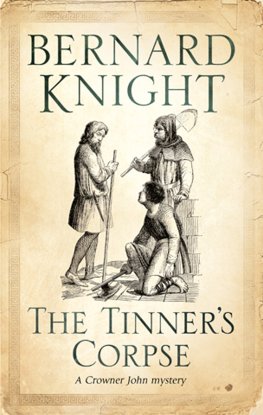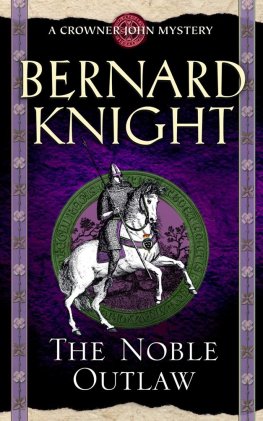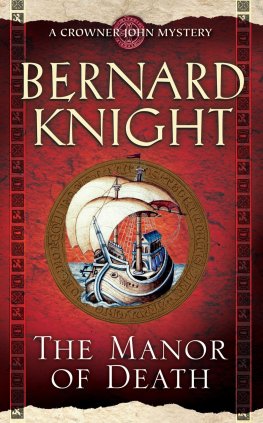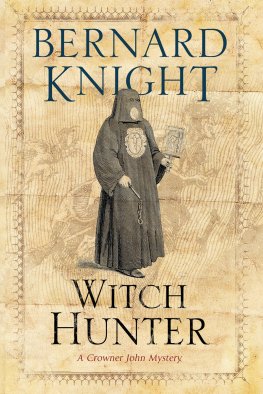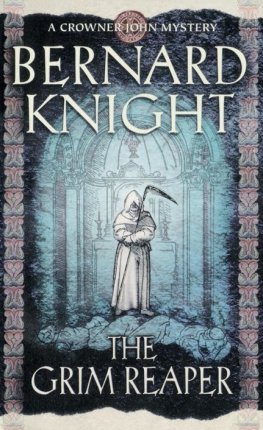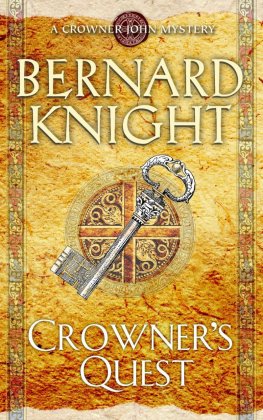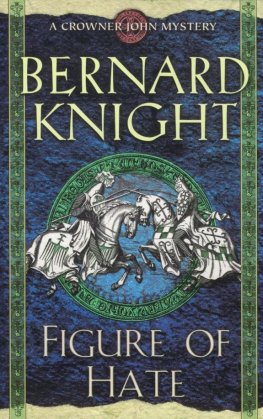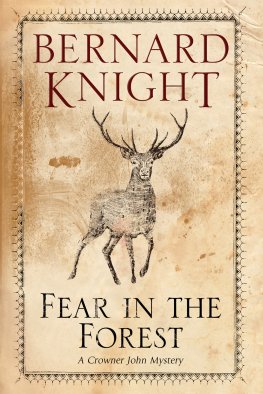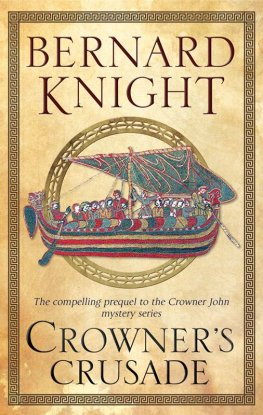Bernard Knight - The Tinner's corpse
Here you can read online Bernard Knight - The Tinner's corpse full text of the book (entire story) in english for free. Download pdf and epub, get meaning, cover and reviews about this ebook. year: 2014, publisher: Severn House Publishers, genre: Detective and thriller. Description of the work, (preface) as well as reviews are available. Best literature library LitArk.com created for fans of good reading and offers a wide selection of genres:
Romance novel
Science fiction
Adventure
Detective
Science
History
Home and family
Prose
Art
Politics
Computer
Non-fiction
Religion
Business
Children
Humor
Choose a favorite category and find really read worthwhile books. Enjoy immersion in the world of imagination, feel the emotions of the characters or learn something new for yourself, make an fascinating discovery.
- Book:The Tinner's corpse
- Author:
- Publisher:Severn House Publishers
- Genre:
- Year:2014
- Rating:3 / 5
- Favourites:Add to favourites
- Your mark:
- 60
- 1
- 2
- 3
- 4
- 5
The Tinner's corpse: summary, description and annotation
We offer to read an annotation, description, summary or preface (depends on what the author of the book "The Tinner's corpse" wrote himself). If you haven't found the necessary information about the book — write in the comments, we will try to find it.
The Tinner's corpse — read online for free the complete book (whole text) full work
Below is the text of the book, divided by pages. System saving the place of the last page read, allows you to conveniently read the book "The Tinner's corpse" online for free, without having to search again every time where you left off. Put a bookmark, and you can go to the page where you finished reading at any time.
Font size:
Interval:
Bookmark:
Bernard Knight
The Tinner's Corpse
PROLOGUE
April 1195 AD
The early spring evening was well advanced when the men downed tools and set off homewards. They were working on the eastern edge of Dartmoor, so could walk back to their dwellings around Chagford within the hour, rather than camp out in the primitive huts dotted all over the high moor. Only eleven of their gang of a dozen tinners trudged down the little valley towards their wives and a good meal. As usual the overman had stayed behind to scrape the last of the precious shode from the wooden troughs, then add it to the pile of ore. Tomorrow it would be taken down to the blowing-house for the first smelting.
The others marched away down the stony gully, following the stream that gurgled between moss-covered boulders under twisted, stunted trees that crouched down from the winds that whistled across the miles of open moorland. Tough as they were, the tinners were weary after the long days work and had little inclination to gossip on the way home. Although their calf-length boots of raw ox-hide were thickly greased, they were not watertight and the mens feet were cold and wet from working in the stream all day. Most had managed a gruff farewell to the foreman they left behind, but in a few moments they were out of sight around the curve of the small ravine down which the South Teign brook sped on its way to join its northern partner at Leigh Bridge. After a few twists, as the ground dropped away from Thornworthy Down, the valley opened up to give a distant vista of fields and woods, with the little town of Chagford nestling in the centre.
Left alone, Henry of Tunnaford surveyed the stream-working with an air of satisfaction and began unhurriedly to tidy up, ready for the next mornings digging. He pulled up the short plank that acted as a sluice-gate at the top of the main trough, letting clean water from the leat run through the system overnight. Henry was a wiry man, not tall and not broad, but still tough and rugged, like most of the tinners. He picked up a fallen shovel and a pick, and took them across to a rough shanty built against the high bank at one side of the workings. It was a crude structure, built of large moorstones and roofed with branches and turf. The hut did service as both a store and a shelter for the men, where they could eat their frugal midday meal when the rain or snow was heavier than usual.
Now Henry stood in the open entrance, his hands on his hips as he surveyed the hundred yards of stream-work, which had eaten into the sides of the valley during the year they had been working this stretch of the little river. The weather had been fairly dry these past few days, but at the top end of the workings, plenty of water still cascaded over the breast to fall in a cataract. Some was guided away by the leat, a planked channel leading down to the long trough that ran immediately alongside the burbling stream.
The opposite bank was being remorselessly hacked away by their gang, the bigger stones and rubbish being dumped into herringbone ridges while the finer gravel was thrown into the trough. A continuous flow of water washed away the lighter tailings and left behind the heavy granules of tin ore.
Proud of his trade, and even prouder of his status as overman, Henry fiddled about for a few more minutes, almost reluctant to leave his workings. He felt an almost proprietorial affection for them, although he was only a wage-earner like the other men. This stream-work was just one of many owned by Walter Knapman of Chagford.
Finally, Henry took his ragged leather cloak from a peg in the hut and threw it around his shoulders, ready for the walk back to his croft at Tunnaford, a mile away to the east of the valley. But as he was on the point of leaving, he could not resist a last foray to the top of the workings to straighten a crooked support below the main trough, which had been undermined by the water flow. This was immediately beneath the low cliff of the stream breast, and as he bent to pull the baulk of timber back into place, he heard a crunching scuffle above him. He looked up in surprise, and the expression on his face rapidly turned to abject terror. A moment later, Henry of Tunnaford was dead.
CHAPTER ONE
The last thing that Sir John de Wolfe needed this morning was another argument with his wife. He arrived back at his home in Martins Lane at about the tenth hour, as the nearby cathedral bell was tolling for Terce, Sext and Nones. He left his great stallion Odin with the farrier opposite, then trudged across the narrow road and bent his black head to enter the front door. As he slumped on to the bench in the vestibule to pull off his dusty riding boots, a strident voice called out from the hall to his left: John! Is that you, John?
Suppressing an urge to reply that it was the Archangel Gabriel come to whisk her up to heaven, de Wolfe yelled back that it was indeed himself and that he was hungry enough to eat a small horse, shoes and all. Before he could summon up the will to go in to meet Matilda, a large hound loped up the covered passage that led from the backyard to the vestibule and laid its slobbering mouth affectionately across his knees. As he fondled old Brutuss ears, Mary the housemaid appeared and, keeping a wary eye on the inner door to the hall, planted a drier pair of lips quickly on his cheek. Shes in a funny mood today, Sir Crowner, she whispered. Mary was a handsome, dark-haired woman of about twenty-five and John felt that he would probably not survive without her: Mary kept him fed and in clean garments, while his wife was seemingly oblivious of his basic needs. She spent most of her time in church.
Matildas always in a funny mood, he growled, as the servant handed him a pair of soft house shoes.
Her brother was here earlier this morning, she murmured. They seemed to be hatching some plot, but I couldnt hear what they said.
She threw his grey wolfskin cloak over her arm and moved towards the covered passage back to her domain in the yard. Ill beat the dust out of this. Do you need anything to eat now?
The coroner shook his head. Just a jug of ale. I broke my fast in Crediton soon after dawn.
He had ridden the day before to Rackenford, a village up towards Exmoor, to hold an inquest on a youth crushed by a collapsed wall. He had left there too late to get back to Exeter before the gates were closed at curfew and had had to spend the night in the hall of a manor near Crediton.
As she was about to vanish down the passage, Mary put her head round the corner for a last word. From what I heard, shes on again about you being away so much.
De Wolfe groaned as he rose stiffly to his feet. Matilda was like a dog worrying at a bone, with her never-ending complaints about his frequent absences, even though it was she who, last September, had nagged him to take this damned job as Devons county coroner. Now, he lifted the heavy iron latch on the inner door and went between the draught screens into the hall. His house was a tall, narrow building, one of three side by side in Martins Lane, which led from Exeters main street into the cathedral Close. Opposite was the farriers forge and stable, which was between the pine end of an alehouse in the high street and St Martins Church.
The gloomy hall into which he now stepped occupied most of the house, rising up to the smoke-darkened roof timbers. Two shuttered windows faced the street, with oiled linen screens across the inside, which let in a little light. Though most of the house was of wood, the back wall was of stone. De Wolfe had had that built a few years back, to allow a large hearth to be constructed, with a new-fangled conical chimney to take the smoke outside. Before, the choking fumes from a hearth-pit in the middle of the floor had had to find their way out through the eaves. The other walls were hung with sombre tapestries to cover the rough planks, and just behind the screens, his chain-mail hauberk and round iron helmet were strung from iron hooks alongside his battered shield with its emblem of a snarling wolfs head in black on a white ground.
Font size:
Interval:
Bookmark:
Similar books «The Tinner's corpse»
Look at similar books to The Tinner's corpse. We have selected literature similar in name and meaning in the hope of providing readers with more options to find new, interesting, not yet read works.
Discussion, reviews of the book The Tinner's corpse and just readers' own opinions. Leave your comments, write what you think about the work, its meaning or the main characters. Specify what exactly you liked and what you didn't like, and why you think so.

